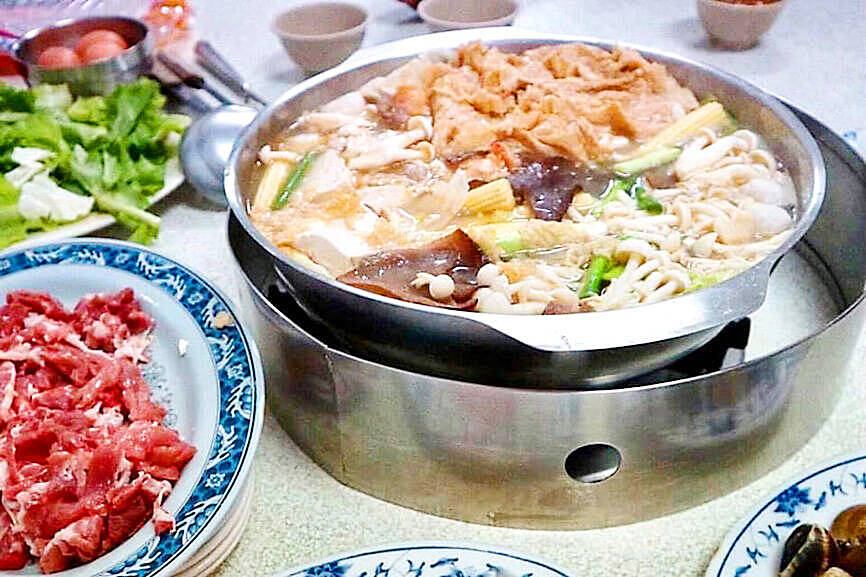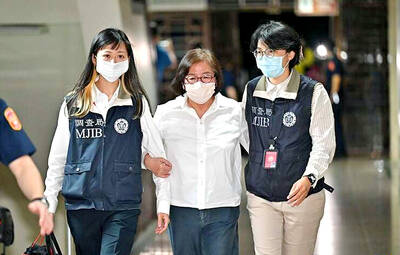Research has showed that consuming drinks hotter than 65°C nearly doubles the risk of esophageal cancer, a Health Promotion Administration (HPA) official said, calling on the public to cool down the food before eating.
While the International Agency for Research on Cancer has classified “very hot” beverages (hotter than 65°C) as “probably carcinogenic to humans” in 2016, a recent study in 2022 showed that the cancer risk of “very hot” drinks is 1.92 times higher than “hot” drinks, HPA Cancer Prevention and Control Division Director Lin Li-ju (林莉茹) said.
Data from the Taiwan Cancer Registry Center showed that among the newly diagnosed esophageal cancer cases in 2021, 75.2 percent were smokers, 52.4 percent occasionally or habitually drank alcohol and 48.9 percent chewed betel nuts.

Photo: Chiu Chih-jou, Taipei Times
There has yet to be any empirically effective screening tool to identify signs of esophageal cancer, the agency said in a news release on Tuesday, urging the public to avoid the disease by following a healthy lifestyle.
The gullet is constantly exposed to germs and pathogenic risk factors and could be prone to lesions, as it is the gateway for food and drinks to enter the gastrointestinal tract, Lin said.
The probability of cancer in the esophagus rises due to risk factors such as long-term smoking, chewing betel nuts and excessive drinking, she said.
Citing the American Cancer Society, Lin said that food cooked by smoking, grilling or pickling, or processed food, increases the probability of tumor development, as the additives are likely to form carcinogenic nitrosamine that harm the mucosa and increase the risk of lesions.
To prevent cancer development in the esophagus, people should adopt a healthy lifestyle, avoid risk factors and cultivate good exercise habits, she said.
People who experience symptoms such as difficulty swallowing, chest pain, foreign body sensations, food or heartburn reflux, a hoarse voice, weight loss, epigastric pain and a chronic cough should see a doctor, the official added.

Costa Rica sent a group of intelligence officials to Taiwan for a short-term training program, the first time the Central American country has done so since the countries ended official diplomatic relations in 2007, a Costa Rican media outlet reported last week. Five officials from the Costa Rican Directorate of Intelligence and Security last month spent 23 days in Taipei undergoing a series of training sessions focused on national security, La Nacion reported on Friday, quoting unnamed sources. The Costa Rican government has not confirmed the report. The Chinese embassy in Costa Rica protested the news, saying in a statement issued the same

Taiwan is to extend its visa-waiver program for Philippine passport holders for another year, starting on Aug. 1, Minister of Foreign Affairs Lin Chia-lung (林佳龍) said on Friday. Lin made the announcement during a reception in Taipei marking the 127th anniversary of Philippine independence and the 50th anniversary of the establishment of the Manila Economic and Cultural Office (MECO) in Taiwan, the Ministry of Foreign Affairs said. The decision reflected Taiwan’s commitment to deepening exchanges with the Philippines, the statement cited Lin as saying, adding that it was a key partner under the New Southbound Policy launched in 2016. Lin also expressed hope

Temperatures in New Taipei City’s Sindian District (新店) climbed past 37°C yesterday, as the Central Weather Administration (CWA) issued heat alerts for 16 municipalities, warning the public of intense heat expected across Taiwan. The hottest location in Taiwan was in Sindian, where the mercury reached 37.5°C at about 2pm, according to CWA data. Taipei’s Shilin District (士林) recorded a temperature of 37.4°C at noon, Taitung County’s Jinfeng Township (金峰) at 12:50 pm logged a temperature of 37.4°C and Miaoli County’s Toufen Township (頭份) reached 36.7°C at 11:40am, the CWA said. The weather agency yesterday issued a yellow level information notice for Taipei, New

CASE: Prosecutors have requested heavy sentences, citing a lack of remorse and the defendants’ role in ‘undermining the country’s democratic foundations’ Five people affiliated with the Chinese Nationalist Party (KMT), including senior staff from the party’s Taipei branch, were indicted yesterday for allegedly forging thousands of signatures to recall two Democratic Progressive Party (DPP) lawmakers. Those indicted include KMT Taipei chapter director Huang Lu Chin-ru (黃呂錦茹), secretary-general Chu Wen-ching (初文卿) and secretary Yao Fu-wen (姚富文), the Taipei District Prosecutors’ Office said in a news release. Prosecutors said the three were responsible for fabricating 5,211 signature forms — 2,537 related to the recall of DPP Legislator Wu Pei-yi (吳沛憶) and 2,674 for DPP Legislator Rosalia Wu (吳思瑤) — with forged entries accounting for